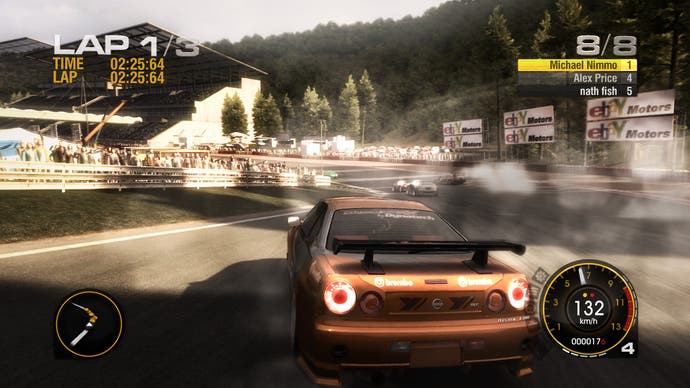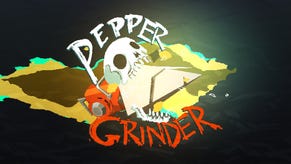Race Driver: GRID
Gentlemen, start your enthusiasm.
Less terrifying, but in need of just as much concentration, are Drift Battles and Drift GPs, which feed into the game's competitiveness with PGR. The mechanics are similar to Bizarre's game - as you overpower the wheels into a turn, the backside of your car slides out and you massage the acceleration and braking triggers to maintain stability. The faster you're going, the more acute the angle, and the closer you are to any flags on the inside kerb, the more points you accumulate for each stunt. By fishtailing along straights and moving seamlessly between opposing drifts, you can build up a combo, with a short grace period after each drift to execute another one and build up a multiplier for your eventual score.
Where it differs from PGR is that you can't rely on riding the kerb, going through traffic-cone gates or performing other "Kudos" manouevres to bridge the gaps in your combo. Even so, the appeal's the same, and the Drift Battle approach of putting you on the same track as seven other drifters, offering more points per drift if you're higher up the field, works superbly alongside the more traditional soloing of the oddly-named Drift GPs, which are knockout tournaments.
Pitched in a happy middle-ground between PGR and things like Gran Turismo, GRID's breezy accelerator has you feathering the right analogue trigger through corners, anxious not to let the rear wheels run away with themselves, with a handling model that happily supports everything the game allows you to do. Fearsome Mustangs, screaming through city streets, struggling to stay in a straight line ahead of so much power, are governed by the same programming as Supras going sideways into banking mountain hairpins and wobbly balsa-wood TVRs, but there's still great coherency. And thanks to the Flashback tool, the threat of proper damage being done to your car (which can flip, lose its wheels, and even go flying over the railings, and loses some of its performance if it takes a big enough knock) isn't enough to stop you firing yourself dauntlessly over the brows of unknown hills, and swinging the nose of your Skyline under the front end of a parked lorry trailer on a Yokohama dockside to achieve a perfect drift on the inside of a competitor.
For those keeping score, that means we're talking about a potential PGR-beater - one that articulates its vehicles and disciplines keenly and distinctly, and encourages you to take risks throughout each race. Completing the formula is the competitiveness of your AI opposition, which fights you right up to the finish line, seizing on your mistakes but making a few of its own too. Cars spin out, nudge one another by accident and misjudge the odd corner, rather than studiously following the racing line, and you soon realise that if a rival ahead of you spins out and you follow him, rewinding with Flashback allows him to rethink his actions too. The damage model also means that violently bullying cars out of the way, corner after corner, is less effective than it has been in other games.

This means, particularly as you close in on the latter stages of the game, that you won't always win. We're not used to this - normally we just pound away until we succeed through weight of experience. But GRID's reputation points system, and the range of things to do, copes with this well. Podium finishes all contribute to your rep, and if you're having no luck whatsoever, there are six events for each of the US, Europe and Japan on the first two tiers, so there's always an alternative. GRID World, the single-player career mode, tasks you with building up a racing team from nothing, and while this begins with a straightforward goal - win GBP 40,000 by completing freelance race contracts so that you can restore a sexy Mustang and start racing for big rep bonuses - before long you're part manager, part driver, sifting through potential team-mates to help you win constructor championships in key events, and micromanaging sponsors.








